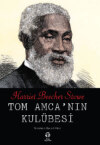Kitabı oku: «The Minister's Wooing», sayfa 11
CHAPTER XIII.
THE PARTY
Well, let us proceed to tell how the eventful evening drew on, – how Mary, by Miss Prissy’s care, stood at last in a long-waisted gown flowered with rosebuds and violets, opening in front to display a white satin skirt trimmed with lace and flowers, – how her little feet were put into high-heeled shoes, and a little jaunty cap with a wreath of moss rosebuds was fastened over her shining hair, – and how Miss Prissy, delighted, turned her round and round, and then declared that she must go and get the Doctor to look at her. She knew he must be a man of taste, he talked so beautifully about the Millennium; and so, bursting into his study, she actually chattered him back into the visible world, and, leading the blushing Mary to the door, asked him, point blank, if he ever saw anything prettier.
The Doctor, being now wide awake, gravely gave his mind to the subject, and, after some consideration, said, gravely, ‘No, – he didn’t think he ever did.’ For the Doctor was not a man of compliment, and had a habit of always thinking, before he spoke, whether what he was going to say was exactly true; and having lived some time in the family of President Edwards, renowned for beautiful daughters, he naturally thought them over.
The Doctor looked innocent and helpless, while Miss Prissy, having got him now quite into her power, went on volubly to expatiate on the difficulties overcome in adapting the ancient wedding-dress to its present modern fit. He told her that it was very nice, – said, ‘Yes, ma’am,’ at proper places, – and, being a very obliging man, looked at whatever he was directed to, with round, blank eyes; but ended all with a long gaze on the laughing, blushing face, that, half in shame and half in perplexed mirth, appeared and disappeared as Miss Prissy in her warmth turned her round and showed her.
‘Now, don’t she look beautiful?’ Miss Prissy reiterated for the twentieth time, as Mary left the room.
The Doctor, looking after her musingly, said to himself, – ‘“The king’s daughter is all glorious within; her clothing is of wrought gold; she shall be brought into the king in raiment of needlework.”’
‘Now, did I ever?’ said Miss Prissy, rushing out. ‘How that good man does turn everything! I believe you couldn’t get anything, that he wouldn’t find a text right out of the Bible about it. I mean to get the linen for that shirt this very week, with the Miss Wilcox’s money; they always pay well, those Wilcoxes, – and I’ve worked for them, off and on, sixteen days and a quarter. To be sure, Miss Scudder, there’s no real need of my doing it, for I must say you keep him looking like a pink; but only I feel as if I must do something for such a good man.’
The good Doctor was brushed up for the evening with zealous care and energy; and if he did not look like a pink, it was certainly no fault of his hostess.
Well, we cannot reproduce in detail the faded glories of that entertainment, nor relate how the Wilcox Manor and gardens were illuminated, – how the bride wore a veil of real point-lace, – how carriages rolled and grated on the gravel walks, and negro servants, in white kid gloves, handed out ladies in velvet and satin.
To Mary’s inexperienced eye it seemed like an enchanted dream, – a realization of all she had dreamed of grand and high society. She had her little triumph of an evening; for everybody asked who that beautiful girl was, and more than one gallant of the old Newport first families felt himself adorned and distinguished to walk with her on his arm. Busy, officious dowagers repeated to Mrs. Scudder the applauding whispers that followed her wherever she went.
‘Really, Mrs. Scudder,’ said gallant old General Wilcox, ‘where have you kept such a beauty all this time? It’s a sin and a shame to hide such a light under a bushel.’
And Mrs. Scudder, though, of course, like you and me, sensible reader, properly apprised of the perishable nature of such fleeting honours, was, like us, too, but a mortal, and smiled condescendingly on the follies of the scene.
The house was divided by a wide hall opening by doors, the front one upon the street, the back into a large garden, the broad central walk of which, edged on each side with high clipped hedges of box, now resplendent with coloured lamps, seemed to continue the prospect in a brilliant vista.
The old-fashioned garden was lighted in every part, and the company dispersed themselves about it in picturesque groups.
We have the image in our mind of Mary as she stood with her little hat and wreath of rosebuds, her fluttering ribbons and rich brocade, as it were a picture framed in the doorway, with her back to the illuminated garden, and her calm, innocent face regarding with a pleased wonder the unaccustomed gaieties within.
Her dress, which, under Miss Prissy’s forming hand, had been made to assume that appearance of style and fashion which more particularly characterised the mode of those times, formed a singular, but not unpleasing, contrast to the sort of dewy freshness of air and mien which was characteristic of her style of beauty. It seemed so to represent a being who was in the world, yet not of it, – who, though living habitually in a higher region of thought and feeling, was artlessly curious, and innocently pleased with a fresh experience in an altogether untried sphere. The feeling of being in a circle to which she did not belong, where her presence was in a manner an accident, and where she felt none of the responsibilities which come from being a component part of a society, gave to her a quiet, disengaged air, which produced all the effect of the perfect ease of high breeding.
While she stands there, there comes out of the door of the bridal reception-room a gentleman with a stylishly-dressed lady on either arm, with whom he seems wholly absorbed. He is of middle height, peculiarly graceful in form and moulding, with that indescribable air of high breeding which marks the polished man of the world. His beautifully-formed head, delicate profile, fascinating sweetness of smile, and, above all, an eye which seemed to have an almost mesmeric power of attraction, were traits which distinguished one of the most celebrated men of the time, and one whose peculiar history yet lives not only in our national records, but in the private annals of many an American family.
‘Good Heavens!’ he said, suddenly pausing in conversation, as his eye accidentally fell upon Mary. ‘Who is that lovely creature?’
‘Oh, that,’ said Mrs. Wilcox, – ‘why, that is Mary Scudder. Her father was a family connection of the General’s. The family are in rather modest circumstances, but highly respectable.’
After a few moments more of ordinary chit-chat, in which from time to time he darted upon her glances of rapid and piercing observation, the gentleman might have been observed to disembarrass himself of one of the ladies on his arm, by passing her with a compliment and a bow to another gallant, and after a few moments more, he spoke something to Mrs. Wilcox, in a low voice, and with that gentle air of deferential sweetness which always made everybody well satisfied to do his will. The consequence was, that in a few moments Mary was startled from her calm speculations by the voice of Mrs. Wilcox, saying at her elbow, in a formal tone: —
‘Miss Scudder, I have the honour to present to your acquaintance Colonel Burr, of the United States Senate.’
CHAPTER XIV
At the period of which we are speaking, no name in the new republic was associated with ideas of more brilliant promise, or invested with a greater prestige of popularity and success, than that of Colonel Aaron Burr.
Sprung of a line distinguished for intellectual ability, the grandson of a man whose genius has swayed New England from that day to this – the son of parents eminent in their day for influential and popular talent, he united in himself the quickest perceptions and keenest delicacy of fibre with the most diamond hardness and unflinching steadiness of purpose. Apt, subtle, dazzling, adroit, no man in his time ever began life with fairer chances for success and fame. His name, as it fell on the ear of our heroine, carried with it the suggestion of all this; and when, with his peculiarly engaging smile, he offered his arm, she felt a little of the flutter natural to a modest young person unexpectedly honoured with the notice of the distinguished of the earth, whom it is seldom the lot of humble individuals to know except by distant report.
But although Mary was a blushing and sensitive person, she was not what is commonly called a diffident girl: her nerves had that steady poise which gave her presence of mind in the most unwonted circumstances.
The first few sentences addressed to her by her new companion were in a tone and style altogether different from any in which she had ever been approached – different from the dashing frankness of her sailor lover, and from the rustic gallantry of her other admirers. That indescribable mixture of ease and deference, guided by a fine tact, which shows the practised, high-bred man of the world, made its impression on her immediately, as the breeze on the chords of a wind harp. She felt herself pleasantly swayed and breathed upon: it was as if an atmosphere were around her in which she felt a perfect ease and freedom – an assurance that her lightest word might launch forth safely, as a tiny boat on the smooth glassy mirror of her listener’s pleased attention.
‘I came to Newport only on a visit of business,’ he said, after a few moments of introductory conversation; ‘I was not prepared for its many attractions.’
‘Newport has a great deal of beautiful scenery,’ said Mary.
‘I have heard that it was celebrated for the beauty of its scenery and of its ladies,’ he answered; ‘but,’ he added, with a quick flash of his dark eye, ‘I never realised the fact before.’
The glance of the eye pointed and limited the compliment; at the same time there was a wary shrewdness in it: he was measuring how deeply his shaft had sunk, as he always instinctively measured the person he talked with.
Mary had been told of her beauty since her childhood, notwithstanding her mother had assayed all that transparent, respectable hoaxing by which discreet mothers endeavour to blind their daughters to the real facts in such cases; but in her own calm, balanced mind she had accepted what she was so often told as a quiet verity, and therefore she neither fluttered nor blushed on this occasion; but regarded her auditor with a pleased attention, as one who was saying obliging things.
‘Cool,’ he thought to himself. ‘Hum – a little rustic belle, I suppose, well aware of her own value; rather piquante, upon my word.’
‘Shall we walk in the garden?’ he said; ‘the evening is so beautiful.’
They passed out the door, and began promenading the long walk. At the bottom of the alley he stopped, and, turning, looked up the vista of box, ending in the brilliantly-lighted rooms, where gentlemen with powdered heads, lace ruffles, and glittering knee-buckles were handing ladies in stiff brocades, whose towering heads were shaded by ostrich feathers and sparkling with gems.
‘Quite court-like, on my word,’ he said: ‘tell me, do you often have such brilliant entertainments as these?’
‘I suppose they do,’ said Mary; ‘I never was at one before, but I sometimes hear of them.’
‘And you do not attend?’ said the gentleman, with an accent which made the inquiry a marked compliment.
‘No, I do not,’ said Mary; ‘these people generally do not visit us.’
‘What a pity,’ he said, ‘that their parties should want such an ornament! but,’ he added, ‘this night must make them aware of their oversight: if you are not always in society after this, it will surely not be from want of solicitation.’
‘You are very kind to think so,’ replied Mary; ‘but even if it were to be so, I should not see my way clear to be often in such scenes as this.’
Her companion looked at her with a glance a little doubtful and amused, and said —
‘And pray, why not, if the inquiry be not presumptuous?’
‘Because,’ said Mary, ‘I should be afraid they would take too much time and thought, and lead me to forget the great object of life.’
The simple gravity with which this was said, as if quite assured of the sympathy of her auditor, appeared to give him a secret amusement. His bright dark eyes danced as if he suppressed some quick repartee; but, drooping his long lashes deferentially, he said, in gentle tones —
‘I should like to know what so beautiful a young lady considers the great object of life?’
Mary answered reverentially, in those words familiar from infancy to every Puritan child, ‘To glorify God, and enjoy Him for ever.’
‘Really?’ he said, looking straight into her eyes with that penetrating glance with which he was accustomed to take the gauge of every one with whom he conversed.
‘Is it not?’ said Mary, looking back, calm and firm, into the sparkling, restless depths of his eye.
In that moment, two souls, going with the whole force of their being in two opposite directions, looked out of their windows at each other with a fixed and earnest recognition.
Burr was practised in every act of gallantry; he had made womankind a study: he never saw a beautiful face and form without a sort of restless desire to experiment upon it, and try his power over the interior inhabitant. But just at this moment something streamed into his soul from those blue, earnest eyes, which brought back to his mind what pious people had so often told him of his mother – the beautiful and early-sainted Esther Burr.
He was one of those persons who systematically managed and played upon himself and others, as a skilful musician on an instrument. Yet one secret of his fascination was the naïveté with which at some moments he would abandon himself to some little impulse of a nature originally sensitive and tender. Had the strain of feeling which now awoke in him come over him elsewhere, he would have shut down some spring in his mind, and excluded it in a moment; but talking with a beautiful creature whom he wished to please, he gave way at once to the emotion: real tears stood in his fine eyes; he raised Mary’s hand to his lips and kissed it, saying —
‘Thank you, my beautiful child, for so good a thought! it is truly a noble sentiment, though practicable only to those gifted with angelic natures.’
‘Oh, I trust not!’ said Mary, earnestly, touched and wrought upon more than she herself knew by the beautiful eyes, the modulated voice, the charm of manner, which seemed to enfold her like an Italian summer.
Burr sighed – a real sigh of his better nature, but passed out with all the more freedom that he felt it would interest his fair companion, who, for the time being, was the one woman in the world to him.
‘Pure, artless souls like yours,’ he said, ‘cannot measure the temptations of those who are called to the real battle of life. In a world like this, how many nobler aspirations fall withered in the fierce heat and struggle of the conflict!’
He was saying then what he really felt – often bitterly felt; but using this real feeling advisedly, and with skilful tact, for the purpose of the hour.
What was this purpose? to win the regard, the esteem, the tenderness of a religious exalted nature, shrined in a beautiful form – to gain and hold ascendency: it was a life-long habit; one of those forms of refined self-indulgence which he pursued, reckless of consequences. He had found now the key-note of the character: it was a beautiful instrument, and he was well-pleased to play on it.
‘I think, sir,’ said Mary, modestly, ‘that you forget the great provision made for our weakness.’
‘How?’ said he.
‘They that wait on the Lord shall renew their strength,’ she replied, gently.
He looked at her as she spoke these words with a pleased, artistic perception of the contrast between her worldly attire and the simple religious earnestness of her words.
‘She is entrancing,’ he thought to himself; ‘so altogether fresh and naïve.’
‘My sweet saint,’ he said, ‘such as you are the appointed guardians of us coarser beings: the prayers of a soul given up to worldliness and ambition effect little; you must intercede for us. I am very orthodox, you see,’ he added, with that subtle smile which sometimes irradiated his features. ‘I am fully aware of all that your reverend Doctor tells you of the worthlessness of unregenerate doings; and so, when I see angels walking below, I try to secure a “friend at court.”’
He saw that Mary looked embarrassed and pained at this banter, and therefore added, with a delicate shading of earnestness —
‘In truth, my fair young friend, I hope you will sometimes pray for me. I am sure if I have any chance of good, it must come to me in such ways.’
‘Indeed I will,’ said Mary, fervently, her little heart full, tears in her eyes, her breath coming quick; and she added, with a deepening colour, ‘I am sure, Mr. Burr, there should be a covenant blessing for you, if for any one, for you are the son of a holy ancestry.’
‘Eh bien, mon ami, qu’est-ce que tu fais ici?’ said a gay voice behind a clump of box, and immediately there started out, like a French picture from its frame, a dark-eyed figure, dressed like a marquise of Louis Fourteenth’s time, with powdered hair, sparkling with diamonds.
‘Rien que m’amuser,’ he replied, with ready presence of mind, in the same tone, and then added —
‘Permit me, madame, to present to you a charming specimen of our genuine New England flowers. Miss Scudder, I have the honour to present you to the acquaintance of Madame de Frontignac.’
‘I am very happy,’ said the lady, with a sweet lisping accentuation of English, which well became her lovely mouth. ‘Miss Scudder, I hope, is very well?’
Mary replied affirmatively, her eyes resting the while, with pleased admiration, on the brilliant speaking face and diamond-bright eyes which seemed looking her through.
‘Monsieur la trouve bien séduisante apparemment,’ said the stranger in a low, rapid voice to the gentleman, in a manner which showed a mingling of pique and admiration.
‘Petite jalouse, t’assure toi,’ he replied, with a look and manner into which, with that mobile force which was peculiar to himself, he threw the most tender and passionate devotion. ‘Ne suis-je pas à toi tout-à-fait?’ and as he spoke he offered her his other arm.
‘Allow me to be an unworthy link between the beauty of France and America.’
The lady swept a proud curtsy backward, bridled her beautiful neck, and signed for them to pass.
‘I am waiting here for a friend,’ she said.
‘Your will is always mine,’ replied Burr, bowing with proud humility, and passing on with Mary to the supper-room.
Here the company were fast assembling in that high tide of good-humour which generally sets in at this crisis of the evening. The scene, in truth, was a specimen of a range of society which in those times could have been assembled nowhere else but in Newport. There stood Dr. H., in the tranquil majesty of his lordly form, and by his side the alert, compact figure of his cotemporary and theological opponent, Dr. Styles, who, animated by the social spirit of the hour, was dispensing courtesies to the right and left with the debonair grace of the trained gentleman of the old school. Near by, and engaging from time to time in conversation with them, stood a Jewish Rabbi with one or two wealthy bankers of the same race, whose olive complexion, keen eyes, and aquiline profile spoke their descent, and gave a picturesque and foreign grace to the scene.
Colonel Burr, one of the most brilliant and distinguished of the rising men of the new republic, and Colonel de Frontignac, who had won for himself laurels in the corps of Lafayette during the recent revolutionary struggle, with his brilliant and accomplished wife, were all unexpected and distinguished additions to the circle.
Burr gently cleared the way for his fair companion, and purposely placing her where the full light of the wax chandeliers set off her beauty to the best advantage, devoted himself to her with a subserviency as deferential as if she had been a goddess.
For all that, he was not unobservant when, a few moments after, Madame de Frontignac was led in on the arm of a distinguished senator, with whom she was presently in full flirtation.
He observed, with a quiet, furtive smile, that, while she rattled and fanned herself, and listened with apparent attention to the flatteries addressed to her, she darted every now and then a glance keen as a steel blade towards him and his companion. He was perfectly adroit in playing off one woman against another, and it struck him with a pleasant sense of oddity, how perfectly unconscious his sweet and saintly neighbour was of the position in which she was supposed to stand by her rival.
And poor Mary all this while, in her simplicity, really thought she had seen traces of what she would have called ‘the strivings of the Spirit in his soul.’
Alas! that a phrase weighed down with such a mysterious truth and meaning should ever come to fall on the ear as mere empty cant: with Mary it was a living form, as were all her words, for in nothing was the Puritan education more marked than in the earnest reality and truthfulness which it gave to language. And even now, as she stands by his side, her large blue eye is occasionally fixed in dreamy reverie, as she thinks what a triumph of divine grace it would be if these inward movings of her companion’s mind should lead him, as all the pious of New England hoped, to follow in the footsteps of President Edwards.
She wishes that she could some time see him alone, where she could talk with him undisturbed. She was too humble, too modest, fully to accept the delicious flattery which he had breathed, in implying that her hand had power to unseal the fountains of good in his soul; but still it thrilled through all the sensitive strings of her nature, a tremulous flutter of suggestion.
She had read instances of striking and wonderful conversions from words dropped by children and women; and suppose some such thing should happen to her, that this so charming, distinguished, and powerful being should be called into the fold of Christ’s church by her means! No, it was too much to be hoped; but the very possibility was thrilling.
When, after supper, Mrs. Scudder and the Doctor made their adieus, Burr’s devotion was still unabated: with an enchanting mixture of reverence and fatherly protection, he waited on her to the last, shawled her with delicate care, and handed her into the small one-horse waggon as if it had been the coach of a duchess.
‘I have pleasant recollections connected with this kind of an establishment,’ he said, as, after looking carefully at the harness, he passed the reins into Mrs. Scudder’s hands; ‘it reminds me of school-days and old times. I hope your horse is quite safe, madam?’
‘Oh, yes,’ said Mrs. Scudder; ‘I perfectly understand him.’
‘Pardon the suggestion,’ he replied, ‘what is there that a New England matron does not understand? Doctor, I must call by-and-by and have a little talk with you; my theologies, you know, need a little straightening.’
‘We should all be happy to see you, Colonel Burr,’ said Mrs. Scudder; ‘we live in a very plain way it is true.’
‘But can always find a place for a friend; that, I trust, is what you meant to say,’ he replied, bowing with his own peculiar grace as the carriage drove off.
‘Really, a most charming person is this Colonel Burr,’ said Mrs. Scudder.
‘He seems a very frank, ingenuous young person,’ said the Doctor; ‘one cannot but mourn that the son of such gracious parents should be left to wander into infidelity.’
‘Oh, he is not an infidel,’ said Mary: ‘he is far from it; though I think that his mind is a little darkened on some points.’
‘Ah!’ said the Doctor, ‘have you had any special religious conversation with him?’
‘A little,’ said Mary; ‘and it seems to me, that his mind is perplexed somewhat in regard to the doings of the unregenerate. I fear that it has rather proved a stumbling-block in his way; but he showed so much feeling! I could really see the tears in his eyes.’
‘His mother was a most godly woman, Mary,’ said the Doctor; ‘she was called from her youth, and her beautiful person became a temple for the indwelling of the Holy Spirit. Aaron Burr is a child of many prayers, and therefore there is hope that he may yet be effectually called. He studied awhile with Bellamy,’ he added, musingly; ‘I have often doubted whether Bellamy took just the right course with him.’
‘I hope he will call and talk with you,’ said Mary, earnestly. ‘What a blessing to the world if such talents as his could become wholly consecrated!’
‘Not many rich, not many mighty, not many noble are called,’ said the Doctor. ‘Yet, if it would please the Lord to employ my instrumentality and prayers, how much should I rejoice! I was struck,’ he added, ‘to-night, when I saw those Jews present, with the thought that it was, as it were, a type of that last ingathering, when both Jew and Gentile should sit down lovingly together at the gospel feast. It is only by passing over and forgetting these present years, when so few are called, and the gospel makes such slow progress, and looking forward to that glorious time that I find comfort. If the Lord but use me as a dumb stepping-stone to that heavenly Jerusalem, I shall be content.’
Thus they talked while the waggon jogged slowly homeward, while the frogs and turtles and the distant ripple of the sea made a drowsy mingling concert in the summer-evening air.
Meanwhile Colonel Burr had returned to the lighted rooms; and it was not long before his quick eye sought out Madame de Frontignac, standing pensively in a window-recess, half hid by the curtain. He stole up softly behind her, and whispered something in her ear.
In a moment she turned on him a face glowing with anger, and drew back haughtily; but Burr remarked the glitter of tears, not quite dried even by the angry flash of her eyes.
‘In what have I had the misfortune to offend?’ he said, crossing his arms upon his breast. ‘I stand at the bar and plead not guilty.’
He spoke in French, and she replied in the same smooth accents —
‘It was not for her to dispute monsieur’s right to amuse himself.’
Burr drew nearer, and spoke in those persuasive, pleading tones which he had ever at command, and in that language whose very structure, in its delicate tu toi, gives such opportunity for gliding on through shade after shade of intimacy and tenderness, till gradually the haughty fire of the eyes was quenched in tears; and in the sudden revulsion of a strong impulsive nature, she poured out to him what she called words of friendship, but which carried with them all the warmth of that sacred fire which is given to woman to light and warm the temple of home, and which sears and scars when kindled for any other shrine; and yet this woman was the wife of his friend and associate.
Monsieur de Frontignac was a grave and dignified man of forty-five. Virginie de Frontignac had been given him to wife when but eighteen; a beautiful, generous, impulsive, wilful girl.
She had accepted him gladly for very substantial reasons. First, that she might come out of the convent where she was kept for the very purpose of educating her in ignorance of the world she was to live in. Second, that she might wear velvet, lace, cashmere, and jewels. Third, that she might be a madame, free to go and come, ride, walk, and talk, without surveillance. Fourth, and consequent upon this, that she might go into company, and have admirers and adorers.
She supposed, of course, she loved her husband – whom else should she love? he was the only man except her father and brothers that she had ever seen; and in the fortnight that preceded their marriage, did he not send her the most splendid bons-bons every day, with bouquets of every pattern that ever taxed the brain of a Parisian artiste? Was not the corbeille de mariage a wonder and an envy to all her acquaintance? and after marriage had she not found him always a steady, indulgent friend, easy to be coaxed as any grave papa?
On his part, Monsieur de Frontignac cherished his young wife as a beautiful, though somewhat absurd little pet; and amused himself with her frolics and gambols, as the gravest person often will with those of a kitten.
It was not until she knew Aaron Burr that poor Virginie de Frontignac came to that great awakening of her being which teaches woman what she is, and transforms her from a careless child to a deep-hearted, thinking, suffering, human being.
For the first time, in his society, she became aware of the charm of a polished and cultivated mind; able, with exquisite tact, to adapt itself to hers; to draw forth her inquiries; to excite her tastes; to stimulate her observation. A new world awoke around her – the world of literature, of taste, of art, of sentiment. She felt somehow as if she had gained the growth of years in a few months. She felt within herself the stirring of dim aspiration – the uprising of a new power of self-devotion and self sacrifice; a trance of hero worship; a cloud of high ideal images; the lighting up, in short, of all that God has laid ready to be enkindled in woman’s nature when the time comes to sanctify her as the pure priestess of a domestic temple.
But, alas! it was kindled by one who did it only for an experiment; because he felt an artistic pleasure in the beautiful light and heat which had burned a soul away.
Burr was one of those men, willing to play with any charming woman the game of those navigators who give to simple natives glass beads and feathers in return for gold and diamonds; to accept from a woman her heart’s blood in return for such odds, ends, and clippings as he could afford her from the serious ambitions of life.
Look in with us one moment, now that the party is over, and the busy hum of voices and blaze of lights have died down to midnight silence and darkness. We make you clairvoyant; and you may look through the walls of this stately old mansion, still known as that where Rochambeau held his headquarters, into this room, where two wax candles are burning on a toilette-table before an old-fashioned mirror.










